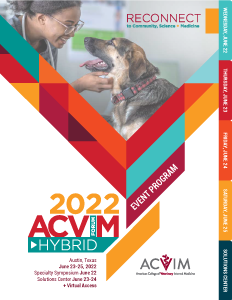Back
Specialty Symposium
Oncology
Identifying Potential Environmental Cancer Risks in Dogs
Wednesday, June 22, 2022
3:15 PM – 4:15 PM CT
Location: ACC 18CD
CE: 1
- LT
Lauren A. Trepanier, DVM, PhD, DACVIM (SAIM), DACVCP
Professor and Assistant Dean of Clinical and Translational Research
University of Wisconsin-Madison
Madison, Wisconsin, United States
Primary Presenter(s)
When internists and oncologists diagnose cancer in dogs, we are typically focused on staging and phenotyping the tumors. However, we rarely gather information from pet owners that might uncover environmental causes for specific cancers such as bladder cancer, lymphoma, and other tumors with clear environmental risk factors in people. This session will present new data on environmental risk factors for lymphoma and bladder cancer in dogs, and will propose the development of a standardized environmental questionnaire to accompany cancer diagnoses in the specialty and primary care setting. The goal is to identify potentially avoidable environmental chemical exposures and support evidence-based cancer prevention policies for dogs and cats.
Learning Objectives:
- To be able to educate owners of high-risk dog breeds about our current understanding of preventable environmental risk factors for bladder cancer and lymphoma.
- To acquire a list of targeted environmental questions that can be asked of dog owners after a canine cancer diagnosis.

